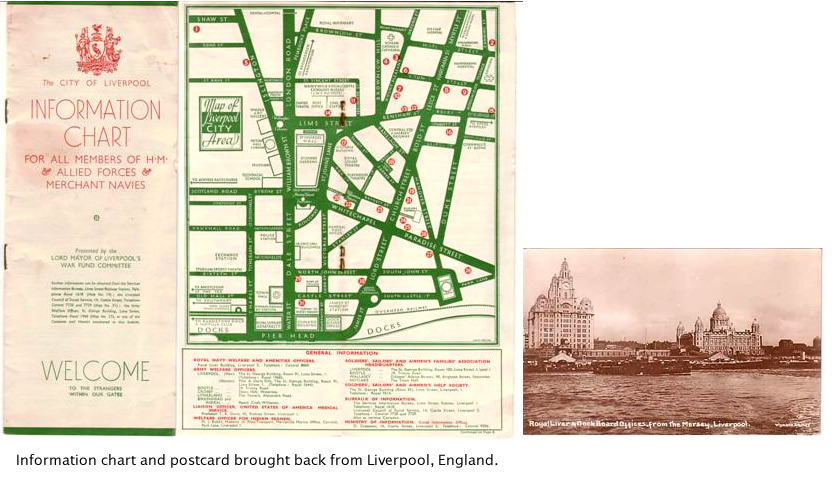Voyage One
SS David G. Burnett - Page 4
It was night when we finished docking at Liverpool. I was so excited that I was the first person off the ship. It was pitch black as everything was blacked out and I couldn't see much of anything but I walked around for awhile. After being cooped up on the ship for weeks I was excited to be on dry land and because it was foreign soil. This was my first time in a foreign country. The first thing I did was Telegraph Della.
We were in Liverpool a couple of days unloading some of the cargo and we went ashore every day. Liverpool, I thought, was really something. It was a big port and a good sized city. I would go to Liverpool several times during the war. It wasn't that Liverpool was so dirty as that it seemed dirty - it gave me that impression. Liverpool had been heavily bombed earlier in the war and there was quite a bit of damage to be seen. German aircraft were still bombing England but not as regularly or with as many planes. I remember walking past piles of bricks everywhere. Whole fronts of buildings had nothing behind them, just completely bombed out.
The first thing next morning we went looking for a beer, but the pubs were all closed. They opened for a few hours in the afternoon, 2:00 until 5:00pm I think, and then they opened in the evening for a few hours. The bars closed early, about ten or eleven as I recall. Whiskey was in short supply - rationed I suppose, as they would limit the number of shots of scotch you could buy. But they had all the beer that you wanted. I remember my first glass of that black beer. "Jesus", I said, "this stuff is horrible. How can they drink this?" But one acquires a taste for it and after awhile I thought it tasted pretty good. Took some getting use to its being warm. It wasn't heated but served at room temperature or a little cool if it was out of the cellar, but we were accustomed to refrigerated American beer - cold beer. After a while though, I really got to like English beer. Everybody talks about how the Germans brew beer but the English make it every bit a good as the Germans.
It might have been that first trip to England that the British gave us these little booklets printed especially for American merchant seamen. It told you how English money worked and how much of it corresponded to our money; gave directions on how to get around and use their public transportation; and had a little dictionary of terms the English used that were different from what we called things in our English - like an elevator being a lift or the hood of a car being called a bonnet over there. I had forgotten that I had kept the thing, but I still have it after all these years.
We were coming out of the picture show one night, either in Liverpool or Manchester, three or four of us, when the air raid sirens went off. People started running in all directions and we didn't know what to do - we just stood there. A young woman came back for us, she must have seen we were Americans. The English could always tell right off that we were Americans - they called us "Yanks". She said "Come with me. " We followed her running about two blocks up the street and down some stairs into an air raid shelter. I recall it as a pretty big place. We could just push in at the bottom of the stairs because it was already crowded with people, so many that I couldn't see to the other end of it. We were down there about half and hour to forty minutes and then they broadcasted the all clear. We walked back to the ship then - quite a distance. Often I would walk 10 to 15 miles and it was nothing to do so back then. The trams would stop running and there weren't any taxis to be had and I just walked back to the docks.
That first trip we were in England just several days. We stopped at some little ports along the Mersey unloading parts of our cargo - ( Birkenhead and Ellesmere Port ) and then we went up to Manchester and Eccles. I really liked Manchester! Manchester was a metropolitan city and a pretty place - a big city. The people there were really friendly. The English people always were nice to me and they respected merchant seamen for the job we were doing much more than folks back in the States did. They showed us their appreciation that we were putting ourselves in danger to get badly needed supplies over to them.


